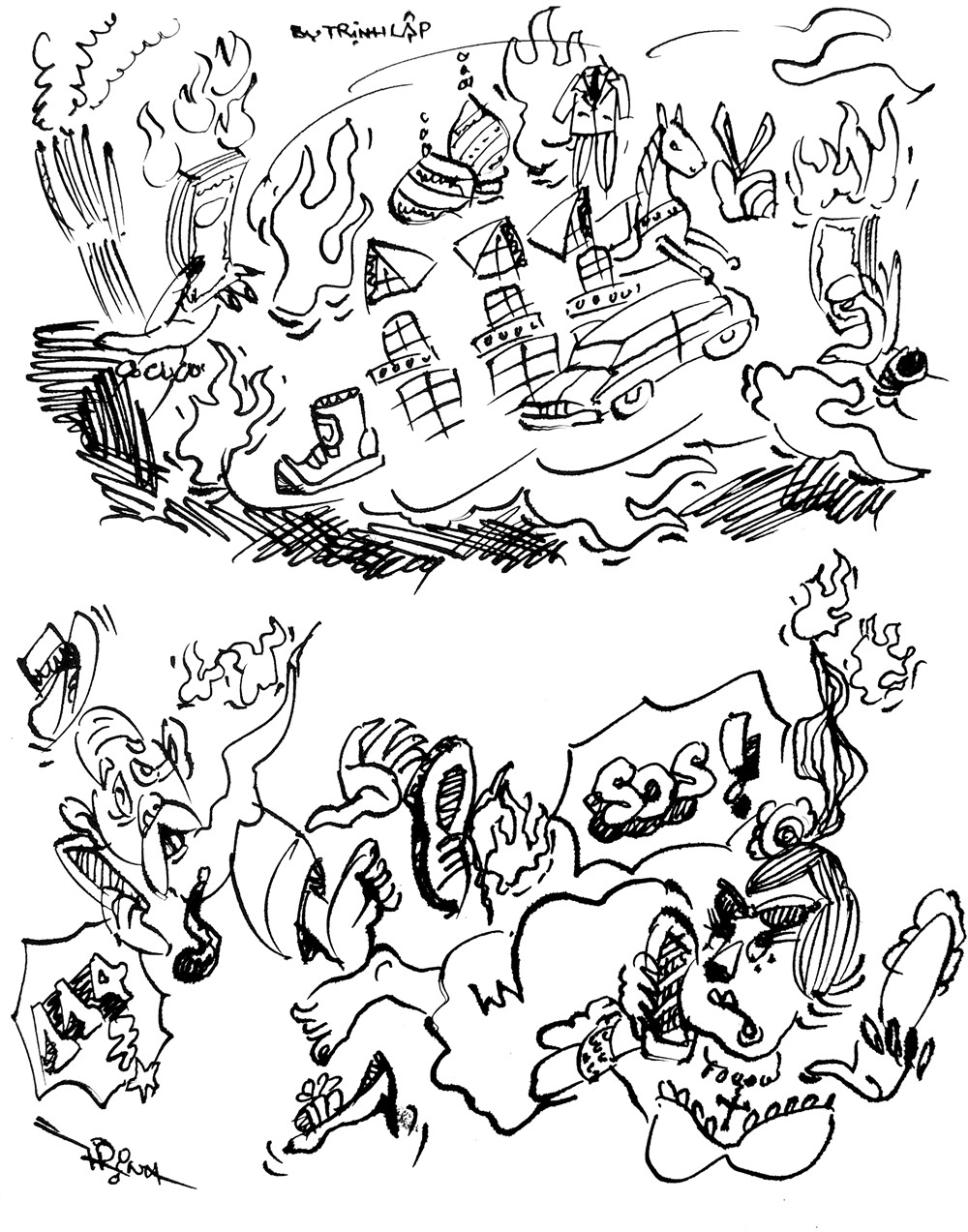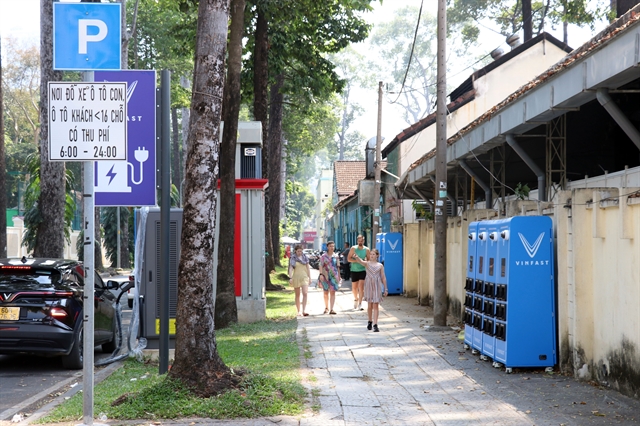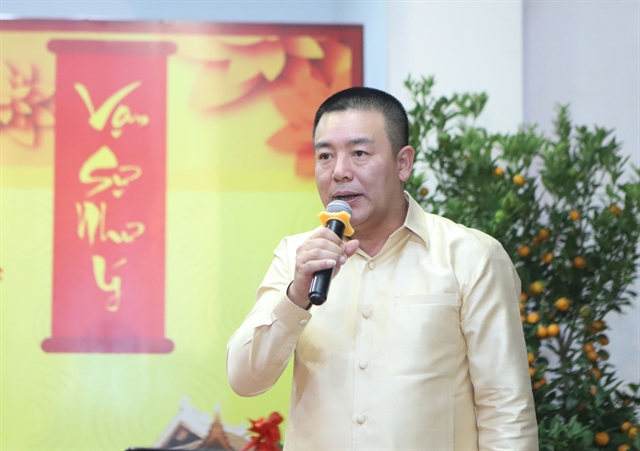 Talk Around Town
Talk Around Town

The burning of joss paper in the form of personal items is a popular tradition around Việt Nam. The paper is burned as part of rituals to honour dead ancestors and the gods. However, as society becomes more environmentally-conscious, the practice has caused controversy.
 |
| Illustration by Trịnh Lập |
By Minh Thu
The burning of joss paper in the form of personal items is a popular tradition around Việt Nam. The paper is burned as part of rituals to honour dead ancestors and the gods. However, as society becomes more environmentally-conscious, the practice has caused controversy. A group of artists has tried to find a solution to satisfy everyone – making the paper models smaller.
“It’s a good way to respect the long-standing tradition, pay tribute to ancestors, save money and protect the environment,” said artist Lê Đức Hùng.
Old tradition
It’s common to see Vietnamese people burning joss paper and offerings during anniversaries, festivals and rituals. The most popular items include replicas of houses, cars, motorbikes, clothes, smartphones, rice cookers, and even servants. In recent years, the offerings have kept pace with modern trends. People burn credit cards, tablets, iPhones, swimsuits and even underwear – all destined to be delivered to loved ones in the afterlife.
The Việt Nam Buddhist Sangha (VBS) issued a document last year calling on people to stop burning joss paper, especially at Buddhist sites, because it is an activity adopted from foreign countries, not a Buddhist ritual. It is a waste of money and harms the environment, according to Most Venerable Thích Gia Quang, vice president of the VBS Executive Council.
“People believe that the afterlife is similar to our world – where the dead need furniture and items like we do,” said Quang.
“The philosophy is adapted from Confucianism and Taoism, not Buddhism. The media and cultural activists have also called on people to stop burning joss paper because it’s wasteful and causes pollution. It may cause fires and accidents.”
There are about 8,000 festivals around the country each year, with most attached to pagodas, temples and rituals. People waste a large amount of money burning votive offerings every year.
Quang acknowledged that the practice is an old tradition of the Vietnamese people. It’s not easy to change what belongs to belief and religion, he said.
“We can’t prohibit the practice, but just raise people’s awareness of the harm burning joss paper causes, with the hope gradually people will change opinions and habits.”
“In my opinion, people can burn a little joss paper to express gratitude to ancestors and gods, instead of spending money on votive offerings. That money can go to charity,” he said.
Historian Dương Trung Quốc called the burning of joss paper a depraved custom, saying it is time to eliminate it.
"I totally agree with the guidelines of the VBS. Who knows if our ancestors can receive the house and furniture we burn or not. What we can see for sure is that paper objects bought with real money turn into smoke and ash after a few minutes.”
“At the age of 70, my friends and I realise that people nowadays burn too much,” he said.
“Before, we just burned some paper money and incense to pay respect to our ancestors.”
“People claim that the afterlife resembles the world of the living. So do we need to burn replicas of an ATM, petrol station or smartphone repair centre?”
Quốc recommends that the VBS should co-operate with cultural authorities to raise people’s awareness on the issue.
Good solution
Responding to the VBS, some artists, including Yến Năng and Lê Đức Hùng, have designed sets of mini paper objects.
“The VBS and the State highly recommend people shouldn’t burn joss paper, but it’s hard to eliminate this habit. So we tried to find a solution to please everyone, and minimise the harm of burning joss paper.”
Painter Hùng and his friends came up with the idea of beautiful paper objects which uphold the traditions and use clean paper which is friendly to the environment.
“The paper objects on the market are made in different sizes – a paper horse could be as tall as two metres. The more paper we burn, the more smoke we breathe in,” said Hùng.
“The money and paper objects are made from waste paper, which hasn’t been recycled in a good way. That’s why the objects create toxic smoke when burned.”
“So we researched and selected clean materials to make these mini votive offering sets. Thanks to the printing techniques, we can put a metallic shine on the joss paper without using materials that are not flammable or cause toxic smoke.”
“The paper horse we make is 15cm high and it can stand without a bamboo structure,” he said.
Each set is sold in a 25cm by 25cm box. The paper objects inside, like clothes, shoes and hats, look like origami. After a year of research, Hùng and his team released their first products before this year’s Lunar New Year festival.
They introduced three sets for Ông Công Ông Táo (Land Genie and Kitchen Gods), New Year’s Eve, and hóa vàng (closing ceremony of Tết).
“Designing is always difficult work, especially in the field of religion, tradition and belief,” Hùng said.
“We designed the details of the paper objects on the computer before printing. Workers just find the right spots and put them together in order.”
Năng is in charge of finding workers for this new kind of joss paper. He returned to his homeland in the northern province of Phú Thọ and quickly employed more than 20 retired people and housewives to join the team. They haven’t made joss paper before.
“With a price of VNĐ68,000 per set, the workers actually don’t receive much money for the work but they are happy to do it,” said Năng.
“They like the designs of the mini joss paper and are willing to get involved in the new trade because it’s interesting.”
The mini sets received support from many people. Thanks to the success, the artists will soon release new sets for special occasions like death anniversaries.
“I believe that we have a good way to go. We are preserving the traditional trade of making joss paper. People will still pay respect to the dead. Meanwhile, we save money and protect the environment.”
“Living in an apartment with few spaces for worship, I’m happy with these smaller paper items,” Hùng said.
Hùng and Năng have even received orders from Vietnamese people living overseas. They realise that the pretty boxes of mini offerings are more suitable for their circumstances.
“We accept the fact that our designs may be imitated and sold for less,” Hùng said.
“If that happens, it means more people are accepting this new style of joss paper and are cutting down on burning the big stuff. That’s our purpose.” VNS




